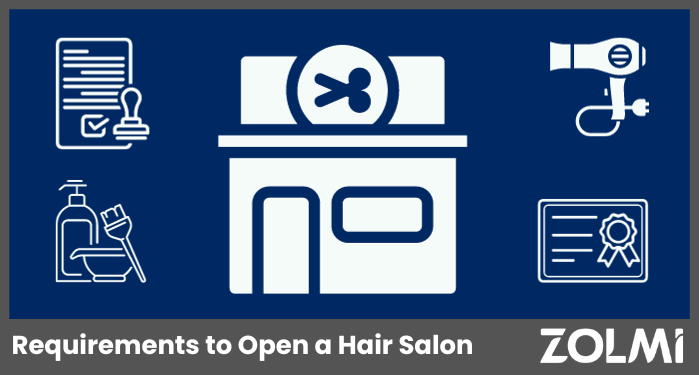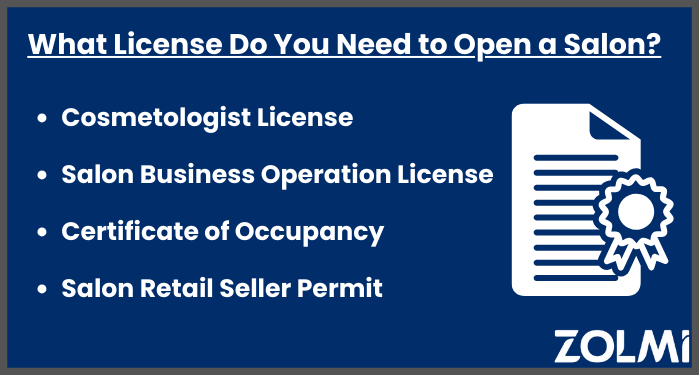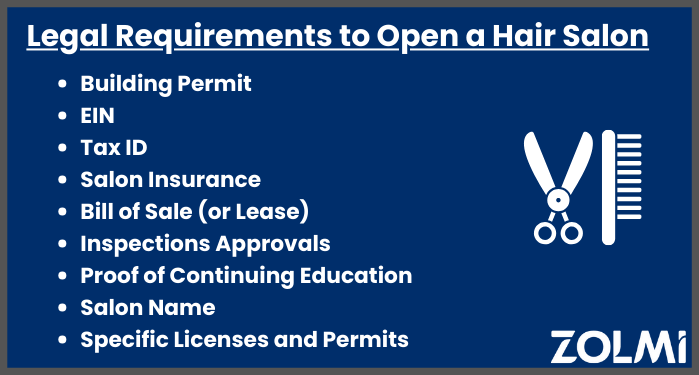Requirements to Open a Hair Salon in 2024


Once you make the decision to become a salon owner, you’ll need to find out what the requirements to open a hair salon are in your area.
Owning a salon is a lot of fun, but a new hair salon opening also comes with a lot of paperwork.
Do you need a license to own a hair salon, and how do you get all the licenses and permits that you’ll need?
The details of this process can vary somewhat, with different states or provinces having their own business licensing requirements, cosmetology license qualifications, and building codes.
With a little bit of research, it’s easy to find out what steps you should take.
In this article, we’ll try to cover the most common requirements for opening a successful salon business.
Disclaimer: This is meant for information purposes only. If you have any legal or financial questions, please consult a professional.
In this article, we’ll take a look at the different business licensing requirements, along with other legal essentials and some more general salon business information to help you set everything up and stay organized throughout the process.
You may find yourself asking “What qualifications do I need to open a salon?”
It’s true that professional hair stylist business license requirements typically vary between states. Even your local government may have its own specific licenses and permits that you have to apply for when starting a new business.
So, do you need a business license for a salon? The answer is most likely yes.
Getting your licenses and permits in order is important (and legally necessary) before you open your salon and welcome customers. Not only is it a legal requirement to operate in most places, but insurance companies will need it, too (more on why insurance is necessary for your business, later).
We’ve made a list of some of the most common licenses and permits for salons, along with what each one is for and how to get it:
To get your professional cosmetology license, you’ll have to be at least 18 years old (although some areas allow apprentices to start working earlier), and have graduated from an accredited cosmetology program or apprenticeship in the industry.
These programs usually require a minimum number of hours of training and practical experience.
After graduating, you’ll take a series of professional exams to test your industry knowledge. Then, you’re eligible to receive your license. The costs can vary widely by state, school, and individual program.
This is your standard type of business license, and it’s required by law in every state or location in North America. Your salon shop license is one of your most basic hair salon requirements that you can’t afford to ignore.
To get a license for your new salon business, you’ll need to either apply at your state department, or at the U.S. Small Business Administration. Make sure that you have your name, business name, and social security number ready.

It’s a good idea to make sure that your building has everything you need to provide salon services to your clients. You’ll need to inspect the equipment and utilities (water, electrical updates, fire safety) in order to get your certificate of occupancy.
Your local building inspection services or government agency will typically carry out the inspection for the certificate of occupancy, so make sure that you get this done before you invest any money in salon setup or do any work on the space yourself.
Your local government’s website will have details for businesses booking inspections, so be sure to check on this and any requirements ahead of time (preferably while you’re searching for a location to set up shop).
What I need to open a salon in one place might be different than what you need to open a salon somewhere else, and retail seller permits are a great example of this variation.
If your shop is in a state that collects sales tax, then you probably need a retail seller permit. This allows you to sell products to customers at your salon, and not just offer services. Without it, you can say goodbye to all of that revenue from retail sales and add-ons.
Check your local government’s website or the U.S. Small Business Administration for more details about the permits required in your specific area.
When you’re creating your budget for your new salon opening, make sure to plan for the costs of business licenses and permits, along with everything else.
In the U.S., it will usually cost a salon business owner somewhere between $100 to $400 to get their license to operate. There will also be a processing fee, along with the cost of the salon license itself.
Do not miss our post on salon license.
Here are a few more things that you will have to take care of if you want your salon business to be a success.
Keep in mind that everything from which permit you’ll need, to the costs and even the taxes you’ll pay will typically vary a bit by state, although some can be the same nationwide.
So, make sure that you do your own research as a business owner and look at the available resources at your municipal office and go online to check out the state websites, too.
Pro Tip: Be sure to include the costs of all licenses and each new permit in your startup costs and business plan.
Here’s a list to help you plan and get started:
Whether you’re planning on building your new salon business from scratch or simply knocking down a few walls to make for room for your clients or some new equipment, you’ll probably need a building permit.
The costs can vary a lot depending on the work that you’re doing, and although the expenses are similar for residents and businesses, the paperwork is different for these services.
These are handled at the state level. Check out the online resources for your state’s website for more details.
This is a federal number, but you’ll need it for both federal and state tax paperwork.
You’ll need it to do payroll for your employees, pay your own taxes, and even to create tax documents for your suppliers.
It also allows each state to collect taxes on any products that your shop sells to each customer. In order to pay tax on these sales, you’ll need your EIN.
The IRS and your state’s website will both provide these services for free, but it can cost about $75 if you pay a third party to do the paperwork for you.
Make sure to bring your business operation license, personal information, and identification, as well as a description of what you’ll be selling your customers and the services you’re providing.
If you aren’t planning to hire any employees, you can get a tax ID, instead. This is a 9-digit number used by the IRS to identify people or companies.
Banks may also require it before they offer you credit or a business loan.
It’s sometimes also called a Taxpayer Identification Number, or TIN. You can get one for your company or yourself by applying directly to the IRS.
This is one that you can’t afford to ignore. Insurance protects your employees, your business and equipment, and each client. It’s also necessary to have it if you want to operate a salon and serve customers.
The most common type of policy is called “general liability” which offers protection for claims of unjust, damage to property, or even (on some occasions) harm to the reputation of your business.
Good salon insurance isn’t free of course, but it’s well worth the cost.
The price can vary depending on your salon size, the expense of your equipment as well as what specialty cosmetology services you offer, but it’s usually somewhere between $50 to $250 a month.
Start by getting some free quotes from a couple of different providers before you choose one.

You’ll want to get all of this done before you start investing any money in your new space.
Although there are online templates to print your lease agreement for your space, many people still visit a lawyer or real estate professional for this service.
If you are buying the business or the property for your salon space, a lawyer will help to draw up the bill of sale.
Along with the fire and electrical safety inspections, your state board will conduct an inspection of the facilities and equipment to make sure that it’s safe for each customer you’ll have, as well as your staff members.
They’ll also want to make sure that you have your other licenses and permits, safety materials, and policies/procedures that your state requires you to display, and your hours of operation.
Check your state’s website to book an inspection and review the costs.
Many states require stylists and other cosmetology professionals to take occasional training courses in order to renew and update their cosmetology licenses.
In the state of Illinois, for example, stylists are required to take courses every two years to update their training and renew their cosmetology licenses.
Many states have specific naming requirements or prohibited words that you can’t use in most business names or marketing. Often, these are in place to stop people from misrepresenting the type of product or service that they offer.
Check the naming requirements for corporations and LLCs (limited liability companies) for your state, or check with a legal professional if you’re unsure.
What is legislation in the salon industry in one state might be different than what’s legally required in another state or even another city. Depending on the specific services that you offer in your own facility.
If you offer clients waxing or tanning services, or more specialized treatments like therapeutic massage, you’ll probably need additional permits or licenses.
You may also need different insurances or permits if you rent booths or salon spaces, so make sure to check these requirements, too.
Do not miss our post on nail salon license.
As we mentioned before, your own particular set of requirements might vary a lot depending on which state you’re in. We can’t put everything from every single state into this article, but here are some ideas to help you find any information that you may still require:
City’s Chamber of Commerce
State’s Chamber of Commerce
The U.S. Small Business Administration (SBA)
City Hall
Trade Associations
To help you get started on your new salon business, we’ve created a handy “Opening a Hair Salon Checklist.” This checklist and article will make it easy for you to keep track of each step that you need to take and keep you organized throughout the process.
Do not miss our post about How Much Does It Cost to Open a Salon.
There is a lot of paperwork involved in opening your new salon, but it’s also a fun and rewarding process to see your dream become a reality. If you’re still wondering how to open a salon, check out our article on this topic.
When in doubt, reach out to other local business owners on social media or in person to make connections and get other tips about upcoming inspections and what to expect.
Although there are many requirements to open a hair salon, planning carefully and doing your research ahead of time can save you hours of time and stress.
What makes a new business start-up successful?
https://link.springer.com/article/10.1023/A:1008168226739
Management theory for small business: Attempts and requirements
https://journals.aom.org/doi/abs/10.5465/AMR.1988.4306873
To start or not to start: Outcome and ability expectations in the decision to start a new venture
https://www.sciencedirect.com/science/article/pii/S0883902608000578